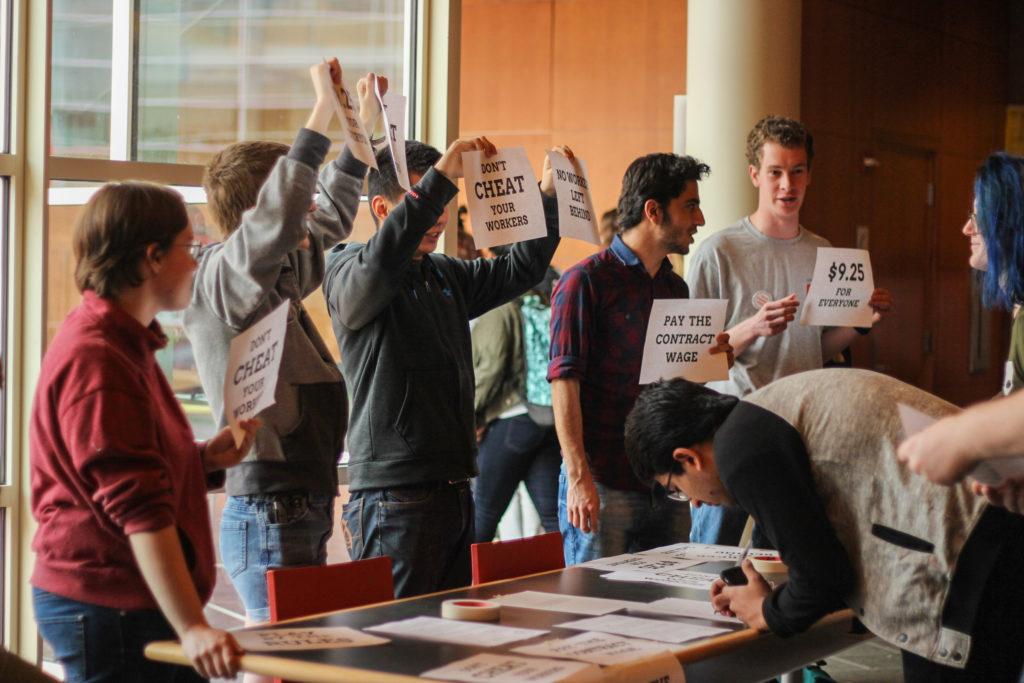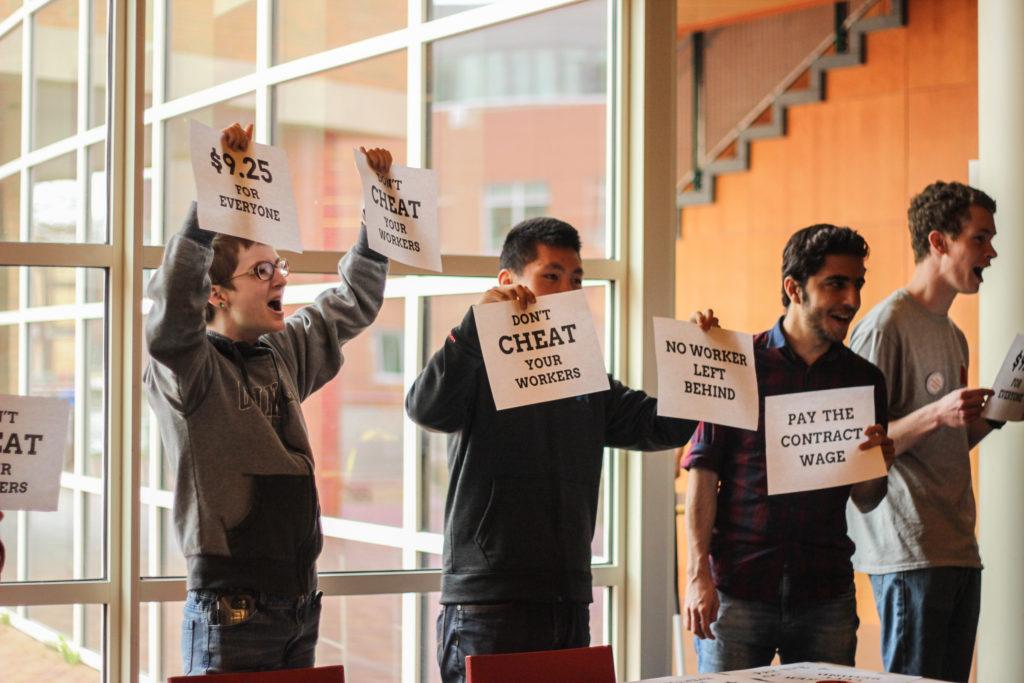
This Monday, April 10, the Union of Grinnell Student Dining Workers (UGSDW) and the student organization Union Labor Advocates (ULA) protested Grinnell College’s exclusion of high school student employees from a pay raise negotiated by the Union last year.
The Union, which was created in response to what UGSDW president Cory McCartan ’19 called a “pattern of understaffing and a lack of accountability on the side of the students,” was initially met with skepticism by Dining Services employees. One employee and student, Charlotte Richardson-Deppe ’19, released an op-ed in May 2016 opposing the creation of the Union in which she cited the Union’s inability to protect full-time Dining Services staff, whose work shifts are not covered by the UGSDW.
In recent communications with Grinnell College and the student body, however, UGSDW has emphasized the importance of inclusivity for College staff not currently enrolled in classes: “From the start, it had been our goal … to include not just college students, but anyone who worked the same kind of jobs [in our contract]. Because it shouldn’t matter what kind of person you are, just that you’re doing the same kind of work,” said McCartan. The comments came in response to what UGSDW treasurer Quinn Ercolani ’20 called “a blatant violation of the contract” by the College for declining to increase the hourly wages for high school employees who work the same shifts as their college student co-workers.
Kelly Edgington, a Marketplace supervisor, commented that “high school workers are very dependable. I’m glad that the Union is fighting for them to get the same wage … my feeling is they’re doing the same job as the college students standing alongside them, and they should be paid the same wage.”
The UGSDW contract, negotiated last year, states that the College “recognizes the Union as the exclusive representative of all employees of Grinnell College Dining Services who regularly work in one or more of the following shifts: Afternoon Service/Utility, Baker’s Helper, Beverages…” — the list includes 40 shift titles, many of which are held by employees not enrolled at Grinnell College. In “Article IV: Wages,” the contract states that “Employees covered by this Agreement shall be paid a base hourly wage of $9.25 per hour.” This wage reflects a raise of $0.75 from the previous wage for employees working under the shift titles listed in the contract.
Earlier this semester, it was brought to the attention of UGSDW representatives that high school students had not been included in the negotiated pay raise and the Union proceeded to file a grievance with the College. To file a grievance, the Union is required to first contact a Dining Services supervisor, and if the grievance is not settled by the supervisor, then the Union may contact the director of Dining Services. In the case that a dispute cannot be put to rest with upper management, the grievance moves along to a neutral arbitration board comprised of faculty and SGA members.
According to Ercolani, the grievance did not proceed as stipulated in the contract. “They refused arbitration, which was a blatant breach of contract. And under the National Labor Relations Board standards, this can be considered both ‘failure to bargain in good faith’ and ‘making unilateral changes to the contract without consulting the other party,’” Ercolani said. “So once that happened, we realized we couldn’t work within the grievance procedure anymore. We tried that, we have this set up with the College for a reason, and they said no.”
The College’s spokesperson on the issue, Vice President of Human Relations Mary Greiner, wrote in an email to The S&B that “when the student union representatives recently asked to include high school students in the union membership, the College turned to the National Labor Relations Board (NLRB) for clarifying guidance regarding the group’s membership definition and eligibility of high school students thereunder. The NLRB has not yet responded to this inquiry.” Because the NLRB had not yet responded to the inquiry, Greiner wrote, the College did not allow the grievance to move on to arbitration.
The Union has since filed a complaint with the NLRB claiming that the College has violated the contract by not including high school students in the Union-negotiated pay raise and refusing arbitration. The College will proceed with the assistance of labor lawyer Frank Harty, whose practice focuses on employment litigation, collective bargaining, contract administration and labor arbitration.
Greiner wrote on Monday that “there is no animosity between the College and the student union,” which Ercolani confirmed. Still, one full-time Dining Services employee noted that Dining Services employees do not perceive the College as union-friendly: “Quite frankly — I don’t think the administration would like it if we unionized … it’s too bad, we have people who have a hard time raising the family, budgeting their money — and there’s many people who work two jobs just to make it go.”































































